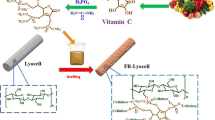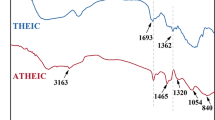Abstract
Biomass materials have become a research hotspot in flame retardant fields due to the non-toxic and eco-friendly features. Lyocell fiber has excellent properties, but the flammability limits its wider application. To address the issue, a green biomass-based flame retardant (ESOPT) was successfully synthesized by using phytic acid, epoxy soybean oil and taurine as raw materials, which were then used for lyocell fabric modification. The lyocell fabric treated with 10 wt.% of ESOPT possessed antibacterial and flame retardant performance. Compared to control sample, the limiting oxygen index (LOI) of modified lyocell fabric increased from 18% of the control sample to 30%. The peak of heat release rate (PHRR) and total heat release (THR) were reduced by 66.5% and 29%, respectively. TG-IR and char residue analysis confirmed the improved flame retardancy of the modified fabric due to the synergistic action of gas phase and condensed phase. In addition, the inhibition rates of modified lyocell fabrics against Escherichia coli (E. Coli) and Staphylococcus aureus (S. aureus) were 73.9% and 82.5%, respectively. The flame retardant fabricated in the present study is environmentally friendly and suitable for endowing lyocell fabric with dual function.
Graphical abstract














Similar content being viewed by others
References
Cheng XW, Guan JP, Yang XH, Tang RC, Yao F (2019) A bio-resourced phytic acid/chitosan polyelectrolyte complex for the flame retardant treatment of wool fabric. J Clean Prod 223:342–349. https://doi.org/10.1016/j.jclepro.2019.03.157
Edgar KJ, Zhang HH (2020) Antibacterial modification of Lyocell fiber: a review. Carbohydr Polym 250:116932. https://doi.org/10.1016/j.carbpol.2020.116932
Gao YY, Deng C, Du YY, Huang SC, Wang YZ (2019) A novel bio-based flame retardant for polypropylene from phytic acid. Polym Degrd Stabil 161:298–308. https://doi.org/10.1016/j.polymdegradstab.2019.02.005
Gottardi W, Nagl M (2010) N-chlorotaurine, a natural antiseptic with outstanding tolerability. J Antimicrob Chemoth 65:399–409. https://doi.org/10.1016/10.1093/jac/dkp466
Guo X, Wang Y, Ren YL, Liu XH (2021) Fabrication of flame retardant lyocell fibers based on carboxymethylation and aluminum ion chelation. Cellulose 28:6679–6698. https://doi.org/10.1007/s10570-021-03931-6
Guo YB, Xiao MY, Ren YL, Liu YS, Wang Y, Guo X, Liu XH (2021b) Synthesis of an effective halogen-free flame retardant rich in phosphorus and nitrogen for lyocell fabric. Cellulose 28:7355–7372. https://doi.org/10.1007/s10570-021-03975-8
Kalali EN, Wang X, Wang DY (2015) Functionalized layered double hydroxide-based epoxy nanocomposites with improved flame retardancy and mechanical properties. J Mater Chem A 3:6819–6826. https://doi.org/10.1039/c5ta00010f
Lee DU, Kim DW, Lee SY, Choi DY, Choi SY, Moon KS, Shon MY, Moon MJ (2022) Amino acid-mediated negatively charged surface improve antifouling and tribological characteristics for medical applications. Colloid Surface B 211:112314. https://doi.org/10.1016/j.colsurfb.2021.112314
Li L, Qi P, Sun J, Liu W, Li HF, Gu XY, Zhang S (2022) Improving the fire performance and washing durability of nylon-cotton blend fabrics by the incorporation taurine derivatives. Prog Org Coat 171:107018. https://doi.org/10.1016/j.porgcoat.2022.107018
Liu XH, Zhang QY, Cheng BW, Ren YL, Zhang YG, Ding C (2018) Durable flame retardant cellulosic fibers modified with novel, facile and efficient phytic acid-based finishing agent. Cellulose 25:799–811. https://doi.org/10.1007/s10570-017-1550-0
Liu YS, Zhang JY, Ren YL, Zhang GL, Liu XH (2022a) Synthesis of a phosphorus- and nitrogen-containing flame retardant and the fabrication of flame retardant cotton. Text Res J 92:3426–3442. https://doi.org/10.1177/00405175221074069
Liu YS, Zhao WJ, Zhang JY, Ren YL, Liu XH, Qu HQ (2022b) Inspired by sodium alginate: Amino acids cooperating with sodium ions to prepare phosphorus-free flame retardant lyocell fabric. Cellulose 29:5339–5358. https://doi.org/10.1007/s10570-022-04596-5
Markwart JC, Battig A, Urbaniak T, Haag K, Koschek K, Schartel B, Wurm FR (2020) Intrinsic flame retardant phosphonate-based vitrimers as a recyclable alternative for commodity polymers in composite materials. Polym Chem 11:4933–4941. https://doi.org/10.1039/d0py00275e
Ozseker A, Karadeniz K, Yilmaz RF (2018) Intrinsically flame retardant polyurethane prepared with epoxidized soybean oil and vinylphosphonic acid. Croat Chem Acta 91:589–597. https://doi.org/10.5562/cca3396
Parzuchowski PG, Jurczyk-Kowalska M, Ryszkowska J, Rokicki G (2006) Epoxy resin modified with soybean oil containing cyclic carbonate groups. J Appl Polym Sci 102:2904–2914. https://doi.org/10.1002/app.24795
Rahman MZ, Kundu CK, Wang X, Nabipour H, Song L, Hu Y (2022) Microwave-initiated modification of polyamide 66 fabric surfaces for superior hydrophilic and flame retardant properties. Polym Degrd Stabil 205:110128. https://doi.org/10.1016/j.polymdegradstab.2022.110128
Ren YL, Liu YS, Wang Y, Guo X, Liu XH (2020) Preparation of durable and flame retardant lyocell fabrics by using a biomass-based modifier derived from vitamin C. Cellulose 27:6677–6689. https://doi.org/10.1007/s10570-020-03218-2
Tu YC, Suppes GJ, Hsieh FH (2009) Thermal and mechanical behavior of flexible polyurethane-molded plastic films and water-blown foams with epoxidized soybean oil. J Appl Polym Sci 111:1311–1317. https://doi.org/10.1002/app.29178
Vu CM, Bach QV (2020) Effects of DOPO-grafted epoxidized soybean oil on fracture toughness and flame retardant of epoxy resin/rice husk silica hybrid. Macromol Res 28:826–834. https://doi.org/10.1007/s13233-020-8102-4
Wei N, Jiang YY, Ying Y, Guo XY, Wu YP, Wen Y, Yang HF (2017) Facile construction of a polydopamine-based hydrophobic surface for protection of metals against corrosion. Rsc Adv 7:11528–11536. https://doi.org/10.1039/c7ra00267j
Wu SP, Hu J, Wei LT, Du YM, Shi XW, Zhang L (2014) Antioxidant and antimicrobial activity of Mail lard reaction products from xylan with chitosan/chitooligomer/glucosamine hydrochloride/taurine model systems. Food Chem 148:196–203. https://doi.org/10.1016/j.foodchem.2013.10.044
Wu H, Lu Q, Zhang JF, Wang JJ, Han XP, Zhao NQ, Hu WB, Li JJ, Chen YN, Deng YD (2020) Thermal shock-activated spontaneous growing of Nanosheets for overall water splitting. Nano-Micro Lett 12:162. https://doi.org/10.1007/s40820-020-00505-2
Wu FY, Xu J, Qiu XY, Lin SC, Zhang MH, Ma M, Shi YQ, He HW, Chen S, Wang X (2021) Super-low-addition Biobased flame retardant dedicated to Polylactic acid through ionic reaction between Phytic acid and taurine. Acs Appl Polym Mater 3:4579–4586. https://doi.org/10.1021/acsapm.1c00671
Yang L, Dai H, Yi A, Lin B, Li G (2008) Structure and properties of partially epoxidized soybean oil. J Therm Anal Calorim 93:875–879. https://doi.org/10.1007/s10973-008-9043-x
Zhang X, Zhang WW, Zhang WC, Yang RJ (2020) Enhanced mechanical and flame retardancy properties of vinyl ester resin systems with the synthesis of two flame retardants with vinyl group. Polym Int 69:1196–1206. https://doi.org/10.1002/pi.6062
Zhang QY, Liu XH, Ren YL, Li YS (2022) Phosphorated cellulose as a cellulose-based filler for developing continuous fire resistant lyocell fibers. J Clean Prod 368:133242. https://doi.org/10.1016/j.jclepro.2022.133242
Funding
This research was financially supported by Tianjin Natural science Foundation (No. 19JCYBJC18300).
Author information
Authors and Affiliations
Contributions
Ya-Ting Zhang: Formal analysis, Investigation, Resources, Writing-Original Draft. Wei Tan: Resources, Formal analysis, revising. Chun-Long Zuo: Resources, Formal analysis. Li-Na Jiang: Resources, Formal analysis. Xi-Zhi Chen: Resources, Formal analysis. Yan-song Liu: Resources, Formal analysis. Yuan-Lin Ren: Conceptualization, Resources, Formal analysis, Supervision, Methodology. Xiao-Hui Liu: Formal analysis, Visualization, Writing-Review & Editing. Ya-Ting Zhang and Wei Tan contributed equally to the work.
Corresponding authors
Ethics declarations
Conflicts of interest
The authors declare that they have no known competing financial interests or personal relationships that could have appeared to influence the work reported in this paper.
Ethical approval
All authors state that they adhere to the Ethical Responsibilities of Authors. In addition, the work is compliance with ethical standards.
Additional information
Publisher's Note
Springer Nature remains neutral with regard to jurisdictional claims in published maps and institutional affiliations.
Rights and permissions
Springer Nature or its licensor (e.g. a society or other partner) holds exclusive rights to this article under a publishing agreement with the author(s) or other rightsholder(s); author self-archiving of the accepted manuscript version of this article is solely governed by the terms of such publishing agreement and applicable law.
About this article
Cite this article
Zhang, Y., Tan, W., Zuo, C. et al. A cleaner and sustainable preparation of green flame retardant and antibacterial lyocell fabric. Cellulose 30, 6081–6097 (2023). https://doi.org/10.1007/s10570-023-05246-0
Received:
Accepted:
Published:
Issue Date:
DOI: https://doi.org/10.1007/s10570-023-05246-0




